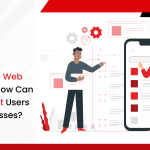Progressive Web Apps (PWAs) are the next evolution of the web, combining the best of the web and the best of apps. They are websites that are intentionally built to be highly engaging, feature-rich applications that are also reliable and installable on a user’s home screen without the hassle of an app store.
In this blog post, we’ll explore what exactly Progressive Web Apps are, their key benefits for both users and businesses, and how companies can leverage PWAs to enhance digital experiences.
How do Progressive Web Apps Work?
Progressive Web Apps use modern web capabilities like responsive design, separate caching of resources with service workers, and push notifications to deliver an app-style experience to users. They are built using common web technologies including HTML, CSS and JavaScript and are not platform-specific like native mobile applications.
PWAs are also discoverable and accessible on the web since they are just web pages that can be opened by any browser. But they also work like applications since they use service workers to work offline, appear full-screen, and can be seamlessly added to home screens without requiring a download.
Key Benefits of Progressive Web Apps
Enhanced User Experience
PWAs provide app-like functionality such as push notifications, offline access, and splash screens right in the browser. This creates smoother and more engaging experiences for users. They load quickly, even on slow mobile networks. Users can also add PWAs to their home screens like regular apps.
Increased Engagement
By creating app-like experiences on the web, PWAs improve user engagement with sites and retain higher percentages of users. The installable home screen experience also makes it easier for users to quickly access sites they use regularly.
Better SEO & Discoverability
Being on the open web means PWAs are indexable by search engines like regular websites and are easily discoverable. They also tend to see increased time-on-site and reduced bounce rates which help SEO.
Lower Development Costs
Unlike native mobile apps, PWAs only need to be developed once for multiple platforms and browsers. Updates also don’t require app store approval processes. Overall development costs tend to be much lower versus creating separate native apps.
Offline Accessibility
Service workers enable PWAs to work offline or on low-quality networks by caching assets, enabling fully functional experiences regardless of internet connectivity. This is a big advantage over regular websites.
How Can Businesses Leverage Progressive Web Apps?
Increase User Engagement & Conversions
With their app-like features and quality experiences, PWAs can help boost engagement metrics like time on site and reduce bounce rates. This can translate to higher conversion rates.
Enhance Brand Recognition
When users add PWAs to their home screens, it puts your brand icon front and center each time they open their device. This improves top-of-mind awareness and recognition over time.
Improve Customer Support
Offline functionality means customers can still access help pages, support information, order status etc without an internet connection for support on the go.
Reduce Development Costs
A PWA only needs development once instead of building separate native apps, saving significant time, maintenance and approval process costs compared to mobile app stores over the long run.
Enhance Reach Across Devices
Since PWAs are web-based, the same application reaches all device types from low-end to high-end seamlessly. You don’t limit your audience potential with separate mobile apps.
Getting Started With Progressive Web Apps
To start implementing PWAs, focus on core components like responsive design, service workers, manifest files and other modern capabilities. Framework support for PWAs is also robust across React, Angular, Vue and others. Extensive developer tools and guides are available to help with the development process as well. Testing ongoing performance using Lighthouse also helps achieve the highest levels of usability and responsiveness.
With their unique ability to blend the best of apps and the open web, Progressive Web Apps present a compelling option for businesses to consider when developing digital experiences moving forward. Their technical underpinnings and user-centric benefits make them well-suited to optimizing engagement across any enterprise website or application project.



